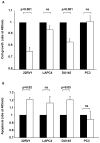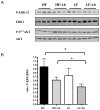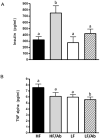Effect of a low-fat diet combined with IGF-1 receptor blockade on 22Rv1 prostate cancer xenografts
- PMID: 22562985
- PMCID: PMC3392522
- DOI: 10.1158/1535-7163.MCT-11-1003
Effect of a low-fat diet combined with IGF-1 receptor blockade on 22Rv1 prostate cancer xenografts
Abstract
In preclinical models, both dietary fat reduction and insulin-like growth factor I receptor (IGF-1R) blockade individually inhibit prostate cancer xenograft growth. We hypothesized that a low-fat diet combined with IGF-1R blockade would cause additive inhibition of prostate cancer growth and offset possible untoward metabolic effects of IGF-1R blockade antibody therapy. Fifty severe combined immunodeficient mice were injected with 22Rv1 cells subcutaneously. Ten days postinjection, the animals were randomized to four groups: (i) high-fat diet + saline (HF); (ii) high-fat diet + IGF-1R blocking antibody, ganitumab (HF/Ab); (iii) low-fat diet + saline (LF); and (iv) low-fat diet + ganitumab (LF/Ab). After 19 days of treatment, the animals were euthanized, serum was collected, and tumors were weighed. Tumor Ki67, Akt and extracellular signal-regulated kinase (ERK) activation, serum insulin, IGF-I and TNF-α were measured. In vitro, ganitumab treatment inhibited growth and induced apoptosis in several prostate cancer cell lines. In vivo, tumor weights and volumes were unaffected by the different treatments. The LF/Ab therapy significantly reduced proliferation (Ki67) and ERK activation in tumors. The HF/Ab group had significantly higher serum insulin levels than the HF group. However, LF/Ab combination significantly reduced serum insulin back to normal levels as well as normalizing serum TNF-α level. Whereas the combination of low-fat diet and IGF-1R blockade did not have additive inhibitory effects on tumor weight, it led to reduced tumor cell proliferation and a reduction in serum insulin and TNF-α levels.
©2012 AACR.
Figures





Similar articles
-
Effects of calorie restriction and IGF-1 receptor blockade on the progression of 22Rv1 prostate cancer xenografts.Int J Mol Sci. 2013 Jul 3;14(7):13782-95. doi: 10.3390/ijms140713782. Int J Mol Sci. 2013. PMID: 23823800 Free PMC article.
-
_targeting IGF-IR with ganitumab inhibits tumorigenesis and increases durability of response to androgen-deprivation therapy in VCaP prostate cancer xenografts.Mol Cancer Ther. 2013 Apr;12(4):394-404. doi: 10.1158/1535-7163.MCT-12-0648. Epub 2013 Jan 24. Mol Cancer Ther. 2013. PMID: 23348048 Free PMC article.
-
Effect of isocaloric low-fat diet on human LAPC-4 prostate cancer xenografts in severe combined immunodeficient mice and the insulin-like growth factor axis.Clin Cancer Res. 2003 Jul;9(7):2734-43. Clin Cancer Res. 2003. PMID: 12855654
-
Plasma and tissue insulin-like growth factor-I receptor (IGF-IR) as a prognostic marker for prostate cancer and anti-IGF-IR agents as novel therapeutic strategy for refractory cases: a review.Mol Cell Endocrinol. 2011 Sep 15;344(1-2):1-24. doi: 10.1016/j.mce.2011.07.002. Epub 2011 Jul 18. Mol Cell Endocrinol. 2011. PMID: 21782884 Review.
-
Bad to the Bone: The Role of the Insulin-Like Growth Factor Axis in Osseous Metastasis.Clin Cancer Res. 2019 Jun 15;25(12):3479-3485. doi: 10.1158/1078-0432.CCR-18-2697. Epub 2019 Feb 11. Clin Cancer Res. 2019. PMID: 30745299 Review.
Cited by
-
Emerging Role of IGF-1 in Prostate Cancer: A Promising Biomarker and Therapeutic _target.Cancers (Basel). 2023 Feb 17;15(4):1287. doi: 10.3390/cancers15041287. Cancers (Basel). 2023. PMID: 36831629 Free PMC article. Review.
-
Effects of calorie restriction and IGF-1 receptor blockade on the progression of 22Rv1 prostate cancer xenografts.Int J Mol Sci. 2013 Jul 3;14(7):13782-95. doi: 10.3390/ijms140713782. Int J Mol Sci. 2013. PMID: 23823800 Free PMC article.
-
Research Evidence on High-Fat Diet-Induced Prostate Cancer Development and Progression.J Clin Med. 2019 Apr 30;8(5):597. doi: 10.3390/jcm8050597. J Clin Med. 2019. PMID: 31052319 Free PMC article. Review.
-
_targeting IGF-IR with ganitumab inhibits tumorigenesis and increases durability of response to androgen-deprivation therapy in VCaP prostate cancer xenografts.Mol Cancer Ther. 2013 Apr;12(4):394-404. doi: 10.1158/1535-7163.MCT-12-0648. Epub 2013 Jan 24. Mol Cancer Ther. 2013. PMID: 23348048 Free PMC article.
-
Obesity, diabetes and aggressive prostate cancer hormone-naïve at initial diagnosis.Cent European J Urol. 2014;66(4):423-7. doi: 10.5173/ceju.2013.04.art7. Epub 2014 Jan 27. Cent European J Urol. 2014. PMID: 24757532 Free PMC article.
References
-
- Freedland SJ. Screening, risk assessment, and the approach to therapy in patients with prostate cancer. Cancer. 2010 - PubMed
-
- Bianchini D, Zivi A, Sandhu S, de Bono JS. Horizon scanning for novel therapeutics for the treatment of prostate cancer. Ann Oncol. 2010;21(Suppl 7):vii43–vii55. - PubMed
-
- Macfarlane RJ, Chi KN. Novel _targeted therapies for prostate cancer. Urol Clin North Am. 2010;37:105–19. Table of Contents. - PubMed
-
- Ngo TH, Barnard RJ, Cohen P, Freedland S, Tran C, deGregorio F, et al. Effect of isocaloric low-fat diet on human LAPC-4 prostate cancer xenografts in severe combined immunodeficient mice and the insulin-like growth factor axis. Clin Cancer Res. 2003;9:2734–43. - PubMed
Publication types
MeSH terms
Substances
Grants and funding
LinkOut - more resources
Full Text Sources
Medical
Research Materials
Miscellaneous

